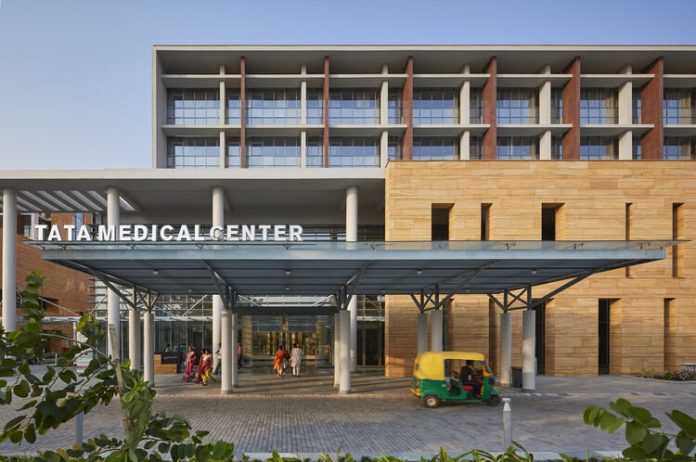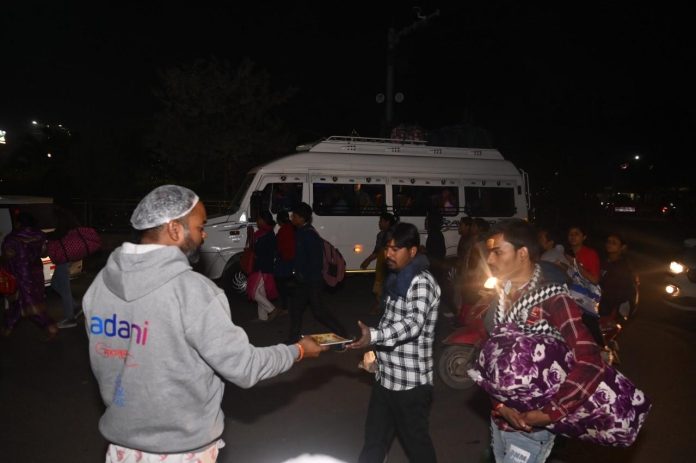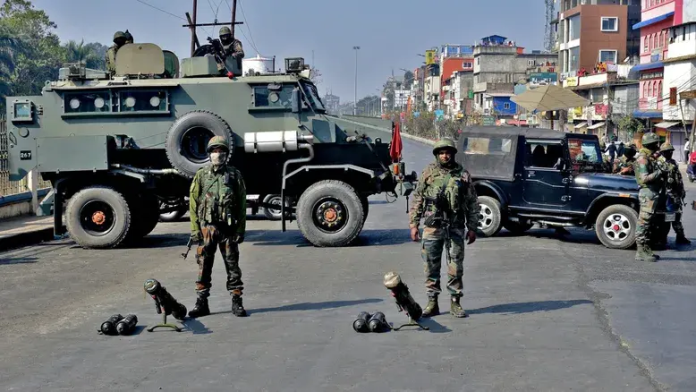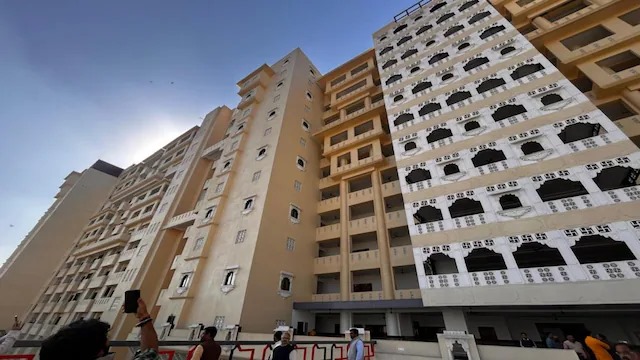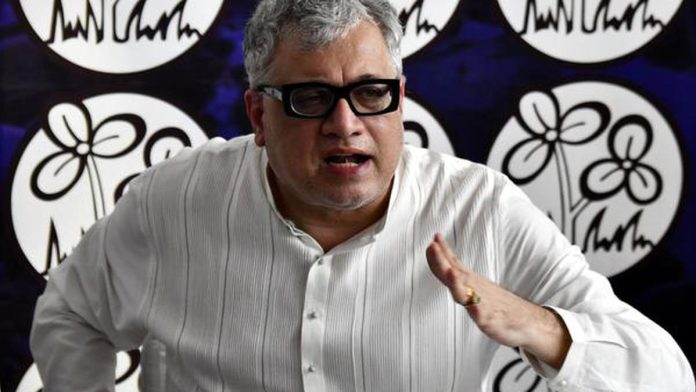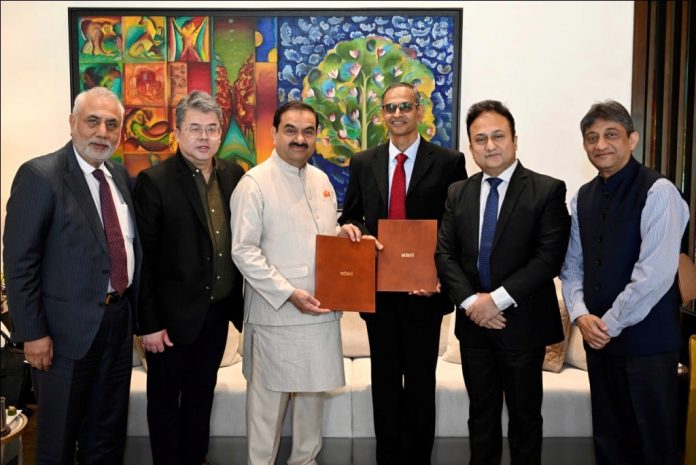Adani Volunteers Distribute Mahaprasad to Stranded Devotees at Maha Kumbh
As lakhs of devotees gather at the Maha Kumbh Mela, the roads in Prayagraj have become major choke points. Heavy traffic congestion has been reported, with thousands of devotees walking for hours to reach their destinations. Travel time to Prayagraj from nearby cities has increased by three to four times, and some arterial roads have traffic jams extending for 10-12 kilometers.
Volunteers Step Up to Help Stranded Devotees
To aid the stranded devotees, Adani-ISKCON volunteers have started distributing food along the congested roads. This initiative ensures that those stuck in traffic for extended periods receive sustenance. In addition to the devotees, the volunteers are also offering Mahaprasad to security personnel managing the large crowds.
Adani-ISKCON’s Mahaprasad Seva Initiative
The Adani Group and the International Society for Krishna Consciousness (ISKCON) have collaborated to serve meals to devotees at the Maha Kumbh Mela. The Mahaprasad Seva is being conducted daily and will continue throughout the duration of the mela, which is set to conclude on February 26. Approximately 2,500 volunteers are actively participating in this large-scale initiative. Since the commencement of the Maha Kumbh Mela on January 13, more than 48 crore devotees have attended the religious gathering.
Challenges in Crowd Management
Roads leading to Sangam Ghat, one of the busiest locations in the Kumbh Mela area, remain completely blocked due to the massive influx of pilgrims. In response, thousands of police personnel have been deployed across the city to manage the crowd. In the past three days alone, about 15 lakh vehicles have entered Prayagraj, further adding to the congestion.
The Adani-ISKCON initiative is proving to be a significant relief effort, ensuring that both devotees and security forces receive essential nourishment amid the ongoing spiritual congregation.
Delhi RSS Office: दिल्ली में संघ दफ्तर केशव कुंज की नई इमारत तैयार
देश की राजधानी में स्थित राष्ट्रीय स्वयंसेवक संघ (RSS) का दफ्तर केशव कुंज अब अपने नए रूप में बनकर तैयार है। दान में मिले 150 करोड़ रुपये से इस संघ कार्यालय को बनाया गया है। अत्याधुनिक संघ कार्यालय में सादगी का पुट भी देखने को मिलेगा तो साथ में गुजरात और राजस्थानी पुट के साथ साथ भारतीय संस्कृति का मिश्रण भी नजर आएगा। इस नए केशव कुंज कार्यालय (Keshav Kunj Office) में 19 फ़रवरी को शिवाजी जयंती पर सरसंघचालक डॉ. मोहन भागवत (Mohan Bhagwat) और सर कार्यवाह दत्तात्रेय होसबाले की उपस्थिति में प्रवेशोत्सव मनाया जायेगा।
2016 में नए निर्माण के लिए हुआ था भूमि पूजन
नई दिल्ली के झंडेवालान में 17000 गज में राष्ट्रीय स्वयं सेवक संघ का कार्यालय 1939 में शुरू हुआ था। 1962 और 1980 में समय के साथ-साथ इस संघ कार्यालय में निर्माण कार्य हुए। इस कार्यालय का नाम संघ के संस्थापक और प्रथम सरसंघचालक डॉ केशव बलिराम हेडगेवार के नाम पर “केशव कुंज” रखा गया था। समय के साथ साथ संघ कार्य का विस्तार हुआ जिसके चलते केशव कुंज कार्यालय के अत्याधुनिकता की आवश्यकता महसूस होने लगी। इसी कारण से इस पूरे परिसर को नये सिरे से बनाने की योजना पर मुहर लगाई गई और सरसंघचालक डॉ मोहन भागवत ने 2016 में नये “केशव कुंज” के लिए भूमि पूजन किया।
Delhi RSS Office 5 लाख स्क्वायर फ़ीट में निर्माण
75000 स्वयंसेवकों और दानदाताओं से मिले हुए 150 करोड़ रुपये से बन कर तैयार हुए इस नए कार्यालय के आर्किटेक्ट के तौर पर गुजरात के अनूप दुबे को चुना गया। करीब 4 एकड़ में बने कार्यालय में करीब 5 लाख स्क्वायर फ़ीट में निर्माण कार्य के तहत 3 टॉवरों का निर्माण कार्य किया गया है। इन टॉवरों का नाम क्रमश: साधना, प्रेरणा और अर्चना रखा गया है। सुरक्षा व्यवस्थाओं को ध्यान में रखते हुए और भविष्य की ज़रूरतों के मद्देनज़र इस कार्यालय का निर्माण किया गया है। इस कार्यालय को इस तरीके से बनाया गया कि भारतीय स्थापत्य संस्कृति को समेटे हुए ये संघ कार्यालय सादगी का प्रतिबिंब नज़र आए।
150 करोड़ की लागत और तीन टॉवर में 300 कमरे
करीब 300 कमरों वाले इस कार्यालय का शुभारंभ विधिवत पूजा अर्चना करके 2024 में सरकार्यवाह मा. दत्तात्रेय होसबाले ने किया। राजधानी दिल्ली के इस संघ कार्यालय में 3 बड़े हॉल बनाये गये हैं। पहले बड़े हॉल का नाम अशोक सिंघल सभागार रखा गया है। इसमें 463 प्रतिनिधियों के बैठने की व्यवस्था की गई है। बाकी के 2 हॉल में क्रमश: 650 और 250 प्रतिनिधि एक साथ सहभागिता कर सकते हैं। इसमें एक साथ 270 वाहनों को पार्क करने वाली पार्किंग भी बनाई गई है।
Delhi RSS Office में वेस्टेज का अंदर ही ट्रीटमेंट होगा
पर्यावरण (RSS and Environment) की सुरक्षा को देखते हुएलकड़ी की खपत कम करने की दृष्टि से दरवाज़ों और खिड़कियों के फ़्रेम ग्रेनाइट के बनाये गये हैं। पूरे कार्यालय में करीब 1000 ऐसे फ़्रेम बनाये गये हैं। इसके अलावा एसटीपी का प्रयोग भी इस कार्यालय में किया जा रहा है जिससे वेस्ट बाहर नहीं फेंका जायेगा, अंदर कार्यालय में ही उसका ट्रीटमेंट किया जायेगा। इसके साथ साथ कार्यालय में 140 केबी का सोलर (Solar in RSS Office) भी लगाया गया है।
आरएसएस ऑफिस के लाइब्रेरी में 8 हजार किताबें
केशव कुंज में 8वें फ्लोर पर सुव्यवस्थित और अत्याधुनिक लाइब्रेरी का भी निर्माण किया गया है। इस लाइब्रेरी में अभी करीब 8 हजार पुस्तकें हैं। और खास बात ये है कि इस लाइब्रेरी में भारत के संविधान के साथ साथ हिंदुत्व के अलावा बौद्धिज्म, जैनिज्म, इस्लाम सहित दुनिया के सभी धर्मों के बारे में सभी भाषाओं में लिखी पुस्तकें मिलेंगी। मीडिया के लिए LED से सुसज्जित नया प्रेस कांफ्रेंस रूम भी बनाया गया है। पहले टावर “साधना” में संघ के प्रकाशन “भारत प्रकाशन और सुरुचि प्रकाशन के कार्यालय रहेंगे। इसके साथ ही प्रचार प्रसार विभाग भी इसमें रहेगा। पांचजन्य और आर्गेनाइजर के कार्यालय भी इस टावर में रहेंगे।
Delhi RSS Office में स्वंयसेवकों के लिए खास इंतजाम
दूसरे टावर “प्रेरणा” में सरसंघचालक, सरकार्यवाह सहित अखिल भारतीय पदाधिकारियों के रुकने की व्यवस्था रहेगी और छोटी छोटी मीटिंग के लिए छोटे रूम या हॉल की व्यवस्था की गई है। इन दोनों टॉवरों के बाद बीच में संघ स्थान बनाया गया है। यहां पर संघ शाखा और स्वयंसेवक एकत्रीकरण हुआ करेगा। इसके बाद तीसरे टॉवर “अर्चना” में कर्मचारियों, प्रवासी पदाधिकारी और कार्यकर्ताओं के ठहरने की व्यवस्था रहेगी। संघ कार्यालय में एक बड़ा भोजनालय भी बनाया गया है जिसमें एक साथ 80 लोग भोजन कर सकते हैं। मेडिकल सुविधाओं के मद्देनजर संघ कार्यालय में भूतल पर ही एक छोटी डिस्पेंसरी बनाई गई है और इसकी खास बात ये है कि ये आम जनता के लिए भी ओपन रहेगा। इसके साथ ही 5 बेड का छोटा इंटरनल हॉस्पिटल भी बनाया गया है।
PM to Inaugurate 98th Akhil Bhartiya Marathi Sahitya Sammelan in Delhi
Prime Minister Narendra Modi is scheduled to inaugurate the 98th Akhil Bhartiya Marathi Sahitya Sammelan on the 21st of this month. The literature festival brings together authors and critics in Marathi and other languages under the same roof.
This conference was first held in 1878 with renowned scholar and social reformer, Mahadev Govind Ranade as the President. But since 1926, this conference started to occur annually and brought scholars and eminent literary figures to discuss a range of topics, including the relevance of the Marathi language in the changing times.
98th Akhil Bhartiya Marathi Sahitya Sammelan
This year, the President of the conference will be renowned Marathi folk literature, culture, traditions and theatre artist, Tara Bhawalkar. The conference is returning to the national capital after a gap of 71st years. The last time Delhi witnessed the Marathi conference was in 1954 with renowned lexicographic Tarkatirth Laxman Shastri Joshi as its president. At that time, the conference was inaugurated by the then Prime Minister Jawaharlal Nehru.
“We need to have original research to be done and published in Marathi to generate interest amongst the people that is a growing trend towards English language and even the government is sanctioning new English medium school,” said Bhawalkar in an interaction with the media.
The three-day conference will be held at Tal Katora Stadium, which will be renamed as ‘Chhatrapati Shivaji Maharaj Sahib Nagari’ for the duration of the event.
Derek O’Brien Criticised the ‘Archaic’ Exception Provided to Marital Rape
TMC party leader in the Rajya Sabha, Derek O’Brien, criticised the ‘archaic’ exception provided to marital rape in the Bharatiya Nyaya Sanhita (BNS). The parliamentarian further explained that such incorrect exceptions in the law can send a dangerous message to the masses that a woman’s right to consent is irrelevant once she enters into a marriage.
O’Brien introduced a private members bill to scrap this exception last week and called marital rape ‘a direct violation of women’s constitutional rights, including personal liberty, equality and privacy’. O’Brien was also part of a joint Parliamentary committee that examined the Bharatiya Nyaya Sanhita before it was enacted. During that time, he along with many opposition leaders, submitted dessent notes objecting to this exception.
“Section 63 of the Bharatiya Nyaya Sanhita continues to provide a disturbing exception for marital rape, undermining the autonomy and equality of women. This archaic exception sends a dangerous message that a woman’s right to consent is irrelevant once she enters into marriage,” O’Brien said.
The Rajya Sabha leader further added that this exception is rooted in outdated beliefs and the patriarchal system. The exception is not just an offence to the dignity of women, but also a direct violation of women’s constitutional rights. He also called the marital rape exception as a legacy of the British colonial legal system, which does not recognise the equality amongst various genders. In his opinion, the state’s failure to remove this exception only perpetuated the cycle of violence and discrimination that continues to harm women.
Section 63 of Bharatiya Nyaya Sanhita
Section 63 defines rape with an exception provided for ‘sexual intercourse or sexual acts by a man with his own wife, the wife not being under 18 years of age’. The Bharatiya Nyaya Sanhita (Amendment) Bill 2024 is a private member bill introduced by O’Brien which proposes to replace this exception with the fact of ‘a subsisting marriage of the accused and the victim shall not be treated as a mitigation factor for the offence under this section’.
नहीं जा पा रहे महाकुंभ, टाटा ग्रुप घर-घर पहुंचाएगा त्रिवेणी संगम जल
महाकुंभ नहीं जा पा रहे ! कोई बात नहीं। टाटा ग्रुप पहुंचाएगा अब हर घर त्रिवेणी संगम जल! टाटा ग्रुप लोगों के लिए एक अच्छी खबर लाया है। अगर किसी वजह से आप महाकुंभ नहीं जा पा रहे हैं तो आप ऑनलाइन त्रिवेणी संगम जल ऑर्डर कर सकते हैं। टाटा ग्रुप के ऑनलाइन ग्रॉसरी स्टोर Big Basket ने एक अनूठी पहल शुरू की है। Big Basket अब श्रद्धालुओं के लिए महाकुंभ मेले से पवित्र संगम जल लेकर आया है जो श्रद्धालु ऑनलाइन खरीद सकते हैं। हिन्दू धर्म में इस जल को सबसे पवित्र माना जाता है।
महाकुंभ त्रिवेणी संगम जल अब ऑनलाइन पहुंचाएगा टाटा ग्रुप
Big Basket की ये पहल उन श्रद्धालुओं के लिए शुरू की गई है जो इच्छा होते भी किसी कारणवश महाकुंभ जाने में असमर्थ हैं। गंगा, यमुना और सरस्वती नदियों के संगम से लिया गया ये जल आध्यात्मिक दृष्टि से बहुत महत्वपूर्ण माना जाता है। हमारे देश में किसी भी पूजा, अनुष्ठान को गंगाजल के बिना पूर्ण नहीं किया जा सकता। इस वक्त समूचे विश्व में प्रयागराज महाकुंभ की धूम मची हुई है। हर व्यक्ति 144 साल बाद आए इस महाकुंभ में संगम में डुबकी मारने को लालायित है। ऐसे में प्रयागराज जाने के सारे रास्ते भीड़ से पटे पड़े हैं। चाहकर भी कुछ लोग महाकुंभ नहीं जा पा रहे। ऐसे में टाटा ग्रुप का ये प्रयास लोगों के लिए अमृत की तरह साबित हो रहा है।
क्या है जल की कीमत
Big Basket पर Svasti Mahakumbh Pavitra Triveni Sangam Jal की 100 ml की बोतल की कीमत मात्र 69 रुपए है। कंपनी दावा करती है कि यह जल पूरी तरह से असली और पवित्र है। महाकुंभ में बलीनकित भी अपना एक अस्थाई स्टोर खोलने जा रहा है, जहां से श्रद्धालु दूध,दही,फ़ल, सब्जियां,चार्जर, पावर बैंक,कंबल तौलिया जैसी जरूरत की चीज़ें ऑर्डर कर सकते हैं। Blinkit के CEO अलबिंदर ढिंडसा ने ये जानकारी X पर दी।
Adani Group Partners with Singapore’s ITEES to Build Skill Academy in Gujarat’s Mundra
The Adani Group has partnered with ITE Education Services (ITEES) of Singapore to build a skilled talent pipeline for serving the needs of industries, including Green Energy, Manufacturing, Hi-tech, Project Excellence and Industrial Design. To build this talent pool of industry-ready workforce, the Adani family will donate over Rs 2,000 Cr for establishing internationally benchmarked schools of excellence. ITEES Singapore is a world leader in providing career oriented technical and vocational training and a key developer of national occupational skills certification and standards.
The Adani Global Skills Academy will be the largest of its kind in the world and provide an immersive learning experience, with innovation centres and AI-based simulators combined with mixed reality based learning, within a fully residential facility for students and faculty. The areas of collaboration will include creating a best-in-class-learning experience that leverages world class infrastructure, immersive technical content and roping in leading faculty with deep expertise across new-age industries.
Talking about the collaboration, Robin Bhowmik, CEO of Adani Skills & Education shared, “This partnership is critical to our initiative as a Group to build high-level technical talent and is in line with our commitment towards the Make-in-India focus across our portfolio. With deep engagement across academic quality assurance, certification-led learning pathways, faculty and student exchange programs and leadership development, this partnership will embed the best of application-led learning to support industries across sectors, thus contributing to Viksit Bharat.”
Adani Global Skills Academy
These finishing schools will be called Adani Global Skills Academy. Students will be selected from technical and vocational education backgrounds in India aligned to their industry and role aspiration. Once these students have been certified in their chosen field of study, they will be employed within the Adani Group as well as the broader industry, depending on their role and field of training. This will ensure that trained professionals are first-day first-hour industry ready and benchmarked to global standards of excellence.
“ITEES is pleased to collaborate with Adani to share ITE’s expertise and knowledge in skills education and training. Through this meaningful partnership, ITEES aims to enhance skill development and create lasting impact by transforming education and lives,” expressed Suresh Natarajan, CEO, ITEES, Singapore.
Programme aims to skill over 25,000 learners annually
In its initial phase, the programme will establish the world’s largest finishing school for technical training in Mundra, Gujarat, aiming to skill over 25,000 learners annually for a wide range of industry and service roles. These learners would be fresh graduates and diploma holders with vocational and technical qualifications from ITIs or Polytechnics, and would be selected for an intensive bootcamp experience within the schools.

